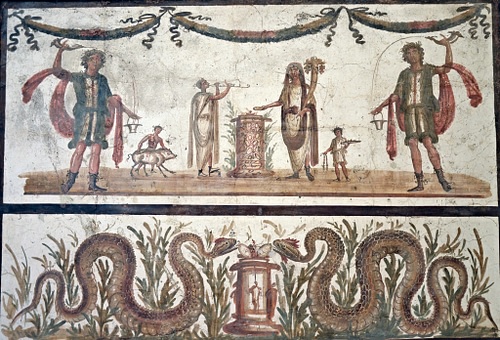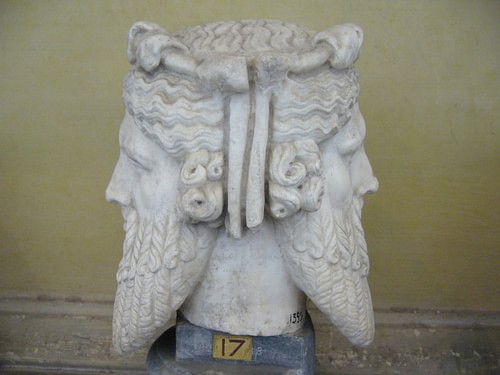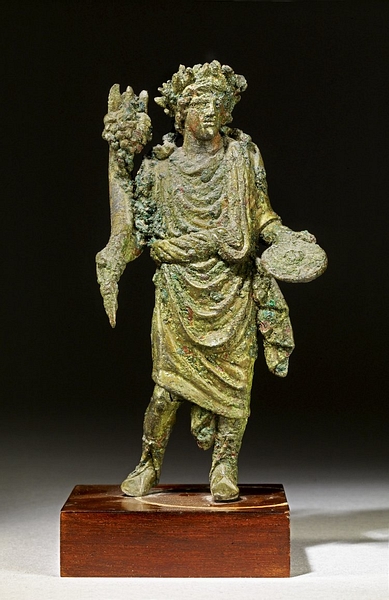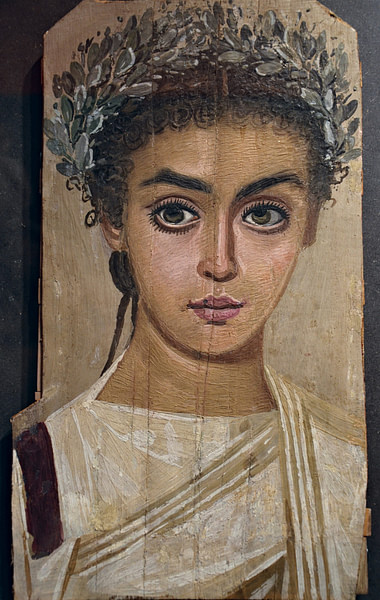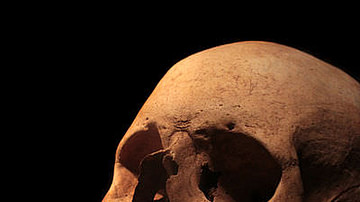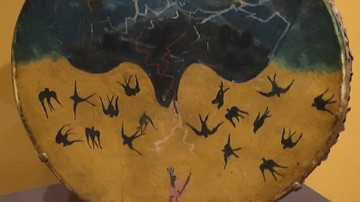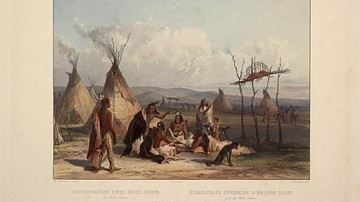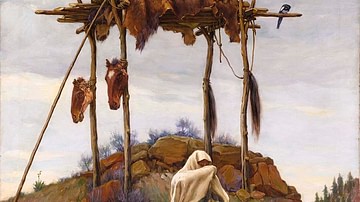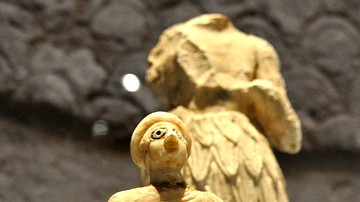To the ancient Romans, everything was imbued with a divine spirit (numen, plural: numina) which gave it life. Even supposedly inanimate objects like rocks and trees possessed a numen, a belief which no doubt grew out of the early religious practice of animism. There were spirits of a place, of rivers and springs, hills and valleys, the home - and even aspects of the home – as well as those who guarded, or could threaten, the people who lived there.
The earth spirits (known as chthonic forces) had never inhabited human form, nor had many of the others, but there were also the spirits of the dead – one's ancestors, the recently deceased, and the general dead – who could influence one's daily life. These spirits, as well as those of the natural world, watched over the daily lives of the Romans, guiding and protecting unless one forgot to honor them properly and give thanks for their gifts.
Spiritual Life of State & Home
In ancient Rome, religion was state-sponsored. The gods were thought to have a vested interest in the health and success of the Roman state and so religious beliefs and practices were not just suggested but mandated. People were expected to participate in state-sponsored religious rituals and festivals but also to appease and honor the spirits of their homes. It seems, considering the number of rituals and daily activities honoring or placating various spirits, that there was no need for such a mandate because people had enough incentive already.
Although there were regular festivals honoring state gods such as Jupiter and Juno, Mars and Saturn, individual Roman lives were influenced to a greater degree by the spirits of the earth, the home, and the spirits of those who had passed on. These state festivals and the honors due to the gods were readily handled by the pontifices (priests), the pontifex maximus (high priest), the rex sacrorum (king of sacred things), the augures (diviners), and the minor priests of the individual deities known as the flamines.
In the individual Roman view, these authorities had the job of honoring the gods well in hand while it was up to each individual household (specifically the head of that household) to honor their own spirits. It seems likely, therefore, that the people thought it was better by far to forget to sacrifice at the temple of Jupiter at a festival than to eat a meal or leave the house in the morning without thanking the spirits which guided, provided for, and protected one's family.
This is not to say forgetting Jupiter was inconsequential by any means, only that the spirits which walked with one daily and guarded the hearth and home took precedence in one's day-to-day rituals because they would make their displeasure known immediately in a person's life while Jupiter might wait to punish the state on a larger scale. Roman religion was based on the concept of quid pro quo (“this for that”), and it was understood that, as long as one paid proper respect to the spirits of one's home, one would enjoy health and prosperity. This was true of the gods as a whole but, the closer to one's daily existence a god or spirit came, the greater attention one needed to pay to those divine forces. Scholar Antony Kamm comments:
To the Romans, religious faith was less a spiritual experience than a contractual relationship between mankind and the forces which were believed to control people's existence and well-being. The result was essentially two-fold: a state cult whose significant influence on political and military events outlasted the Republic, and a private concern, in which the head of the family supervised the domestic rituals and prayers in the same way as the elected representatives of the people performed the public ceremonials. (Nardo, 58)
Every household, it was believed, functioned in relation to how well the people of the house treated their spirits. A home in which rituals were kept and the spirits were honored would thrive – and a successful homeowner could point to his prosperity as evidence of his devotion and piety – while those who neglected the spirits would suffer accordingly.
There were many different spirits in Roman religious belief, but the ones who most directly affected a family's home and daily life were:
- Panes & Penates
- Lares
- Parentes
- Manes
- Lemures
- Genius
- Genius Loci
- Umbrae
Additionally, there was the god Janus, god of beginnings but also of gates and doorways, and Vesta, goddess of the hearth and home, who required the homeowner's special attention. Janus also had helper-deities in guarding the doors of a house: Cardea (goddess of hinges), Forculus (god of the door itself, especially double doors), and Limentinus (god of the threshold). Further, the boundaries of one's property were protected by another god, Terminus, who inhabited the boundary stone marking one's property line from a neighbor's.
All of these supernatural forces needed to be honored or placated, even though Janus and Vesta had state-sponsored festivals and Vesta, of course, had her Vestal Virgins who kept her flame eternally burning in her temple. The only beings one had no hope of influencing were the fates, known in Rome as the Parcae. As in Greece, there were three fates, Nona (nine-month birth), Decima (ten-month birth), and Morta (stillbirth). Nine-month birth was thought premature and the child could die while ten-month birth was considered healthy and normal. The Parcae evolved from birth-goddesses who decided one's fate at birth and there was nothing one could do about that. There were plenty of other supernatural entities, however, one could influence directly and upon whom one's prosperity depended.
The Spirits
Panes and Penates (pronounced Pah-nays and Pe-nah-tays) were the spirits of the pantry and the kitchen. It was the panes/penates who kept food in the house and provided a pleasant atmosphere in which to live. They protected foodstuffs from spoilage but also provided the means whereby a family procured food in the first place. Accordingly, statuettes of the panes/penates would be taken out of their cabinet, usually located in the kitchen area, and set on the table during meals. Families gave thanks to them before eating and a portion of the meal was set aside in their honor and then burned afterwards in the hearth fire as a ritual offering to them. The first fruits of the harvest were offered to them regularly and they were thanked at every significant event in a family's life such as a birth, a birthday, promotion, or the marriage of one's children. There was a public festival of communal thanksgiving and offerings around 14 October annually.
Lares (pronounced Lah-rays) took on different characteristics at different times in Rome's history and were considered guardian spirits and the spirits of one's dead ancestors in different eras. They seem to have originally been the children of the gossiping nymph Lara (also known as Larunda) who betrayed the affair of her fellow nymph, Juturna, with Jupiter to his wife Juno. Jupiter then cut her tongue out to keep her from telling any more secrets and had Mercury escort her to the underworld. On the way there, however, Mercury fell in love with her and their union produced the lares who then became guardian spirits of a family and home.
Alternately, the lares were the spirits of one's familial dead (not the general dead) requiring acknowledgement and honor daily. There was a cupboard-shrine in the home (the lararium), usually in the atrium, which housed their statuettes and from which they worked to make sure the family prospered. In this, they were closely associated with the panes/penates and rituals to all three were often combined. These spirits were known as Lares Familiares (spirits of the family) or Lares Domestici (spirits of the home) but lares were also acknowledged in protecting the community (Lares Compitales) and were honored at the Compitalia Festival on 22 December. Daily prayers and offerings were made to the lares throughout the year but elaborate rituals were enacted on special days such as a birthday, wedding, anniversary, or departure or return from a journey. When a family moved permanently from one house to another, the lares, panes, and penates would move with them.
Parentes (pronounced Pah-rent-ays) were associated with the lares as defined as the spirits of one's ancestors but were also those of one's immediate family - a mother or father - who had passed on but were also the spirits of one's living family. If a Roman were to travel to, say, Athens, he would bring along the statuettes of his wife and children, along with some fire from his hearth, so that wherever he went, they would go also. In the popular film Gladiator (2000 CE), the statuettes Maximus prays to of his wife and son would be parentes and the "blessed father" he invokes in his prayers would be his own father, the "blessed mother" his own mother, not a deity like Jupiter or Juno. The parentes were honored at the festival of Parentalia, a nine-day festival beginning on 13 February honoring the lares and penates which closed with the festival of Feralia on 21 February when one would visit the graves of the dead and leave them gifts. The next day, 22 February, was the personal, familial observance of Caristia when one would honor one's living family and make amends with family members one might be at odds with. Parentalia and Feralia honored those who had passed on but were still present and potent influences in one's life, while Caristia focused on appreciating the members of one's family while they lived.
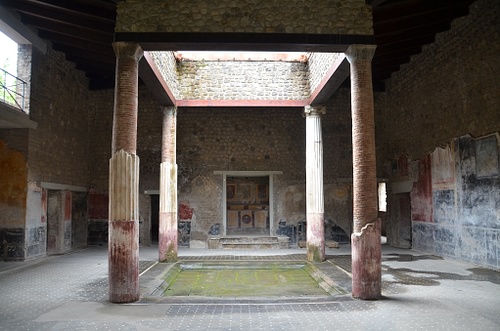
Manes (pronounced Mah-nays) were the collective dead (di manes = the divine dead) who inhabited the afterlife. Anyone who died became a mane and then were specified as a lare or a parentes by their family. The mane was the divine spark of life in each person which was thought to reside in the head. Busts of one's father, mother, or more distant ancestors were made not only to honor and remember them through a work of art but, just as importantly, to allow their mane to inhabit the bust whenever it pleased and to make it welcome. These busts were usually located in the atrium of a home, the public room of the house where parties were thrown or serious political or civic discussions were held. The manes could, therefore, participate in these gatherings through their busts. Manes were included in the festival of Parentalia as well as those of the Feralia and the Lemuria, though this latter festival was focused far more on the lemures.
Lemures (pronounced Leh-mur-ays) were the uneasy or wrathful or mischievous dead. Today a lemure would be known as a poltergeist, an angry spirit who disrupts the home until its needs are addressed or it is exorcised by some spiritual authority. These spirits were collectively manes – divine spirits of those who had once lived - but were those who, for one reason or another, were unhappy in the afterlife. The most common reason for a spirit to return as a lemure was improper observance of funerary rites or burial or not complying with the deceased's wishes as set down in their will. A mane could also return as a lemure, however, if they felt they were not being properly honored and remembered by the family. A lare, parentes, or the collective mane could become lemures if proper offerings and prayers were not made to their satisfaction. The Roman poet Ovid (43 BCE-17 CE), in his work Fasti, Book V (8 CE), describes how the lemures brought chaos on Rome when the people forgot to honor them properly through the Lemuria festival. Lemuria was held 9,11, and 13 May and would later become All Saint's Day in the Church, honoring the holy dead, before it was moved to 1 November in the 9th century CE.
Genius was the household spirit of manhood and was symbolized by the snake. The household genius was honored on the birthday of the head of the household and was defined as "a spirit of manhood" with special influence over the marriage bed. The genius was also thought to enable the head of the household to do what needed to be done. The genius of the house, manifested in the paterfamilias – the father and head of the family – ideally worked in concert with the Genius Loci – the spirit of the ground on which one's house was built. These two spirits were completely different entities but if the genius loci was honored and appeased, then the genius of the household would be also and the family would live in peace and prosperity.
Umbrae (shades) were ghosts who returned from the afterlife and were also referenced as imagines, species, and immanes (shapeless). Umbrae were neither good or bad but could be interpreted as either depending on how they appeared to a person. If a ghost appeared to one in a dream, this was usually considered a good thing but only if it was the spirit of a loved one and especially if the ghost relayed some important information such as where they had put their will or some valuable the family thought lost. Conversely, if the spirit of a stranger appeared in a dream, it was a bad omen and, even worse, if a ghost appeared to a person who was awake. This was interpreted as a haunting for some misdeed on the part of the living person. One would then need to examine what one might have done (such as skimping on the funeral feast) and make amends. Umbrae were honored with the other spirits at Feralia and Lemuria but, just to be safe, amulets and charms were worn or placed on doorposts or in rooms and rituals observed to placate and keep them away.
Conclusion
Everyone, throughout their lives, was watched over or influenced by some combination of the above spirits. There is no spirit mentioned in Roman religious or secular literature, however, specifically named as attending a person's death. Antony Kamm notes:
While a spirit of some kind watched over a person at most times and on most occasions from conception to death, at the actual moment of death there was none. The religious element in the funeral rites was directed towards a symbolic purification of the survivors. (Nardo, 65)
The funeral, then, was for the living, not to specifically honor the dead. The family would sacrifice a pig, carry out a ritual cleansing of the house, and then have a feast with guests as a symbol of life continuing on in the home. Once the dead had moved on as spirits, then was the time for worship and prayers honoring who they had been in life and who they remained in the afterlife. The common belief was that the dead continued to live and had simply been transformed by death to another realm. There was no need for a spirit to watch over or protect them at the moment of death or at their funeral because they were now one of the divine dead and could take care of themselves.
Only the living, who daily lived with the uncertainty of their future, required spiritual protection and assurance. The spirits of the dead, as well as the eternal spirits of the earth, guided and protected the Romans in their daily endeavors but, when forgotten, or when a sacrifice or prayer seemed more an act of custom than of actual care, the spirits withdrew their favor and one suffered misfortune great or small. It was for this reason, as noted earlier, that a typical Roman family, no matter how devoutly they attended the state rituals and festivals honoring the gods, would always make sure to honor the spirits of their hearth, home, and those who had gone before them.
